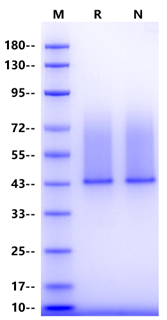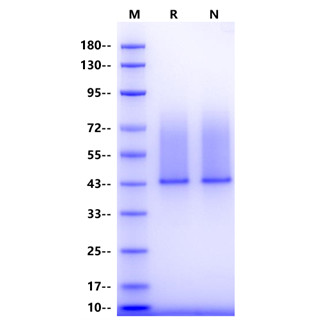Product Details
Product Details
Product Specification
| Species | Mouse |
| Synonyms | Syndecan Proteoglycan 1, CD138, SYND1, SDC, Syndecan-1, SDC1 |
| Accession | P18828-1 |
| Amino Acid Sequence | Gln23-Gly255, with C-terminal 10*His QIVAVNVPPEDQDGSGDDSDNFSGSGTGALPDTLSRQTPSTWKDVWLLTATPTAPEPTSSNTETAFTSVLPAGEKPEEGEPVLHVEAEPGFTARDKEKEVTTRPRETVQLPITQRASTVRVTTAQAAVTSHPHGGMQPGLHETSAPTAPGQPDHQPPRVEGGGTSVIKEVVEDGTANQLPAGEGSGEQDFTFETSGENTAVAAVEPGLRNQPPVDEGATGASQSLLDRKEVLGGGGSGGGSHHHHHHHHHH |
| Expression System | HEK293 |
| Molecular Weight | 44kDa |
| Purity | >95% by SDS-PAGE |
| Endotoxin | <0.1EU/μg |
| Conjugation | Unconjugated |
| Tag | His Tag |
| Physical Appearance | Lyophilized Powder |
| Storage Buffer | PBS, pH7.4 |
| Reconstitution | Reconstitute at 0.1-1 mg/ml according to the size in ultrapure water after rapid centrifugation. |
| Stability & Storage | · 12 months from date of receipt, lyophilized powder stored at -20 to -80℃. · 3 months, -20 to -80℃ under sterile conditions after reconstitution. · 1 week, 2 to 8℃ under sterile conditions after reconstitution. · Please avoid repeated freeze-thaw cycles. |
| Reference | 1、Palaiologou M. et al. (2014) CD138 (syndecan-1) expression in health and disease. Histol Histopathol. 29(2): 177-189. |
Background
CD138 (syndecan-1, Sdc-1) is a member of the syndecan family that comprises heparan sulfate proteoglycans. CD138 is significant for cell-cell and cell-matrix interactions. In adult human tissues, CD138 is predominantly expressed in epithelial cells and plasmacytes. CD138 immunoexpression is altered in a wide spectrum of benign inflammatory, infectious and fibrotic diseases (colitis, allergic contact dermatitis, fibrosis of various organs, etc) and diabetes mellitus type II. Furthermore, CD138 is involved in molecular pathways that are deregulated during carcinogenesis and are related to cell proliferation, apoptosis, angiogenesis, tumour invasion and metastasis.CD138 tumour cell and stromal immunoexpression is modified in various types of cancer, and is frequently correlated with clinicopathological parameters and patients' prognosis. The soluble form of CD138 may be used as a prognostic serum biomarker with promising results in respiratory tract carcinomas. CD138 plays a crucial role in carcinogenesis and is an attractive target for anticancer treatment with heparanase inhibitors and anti-CD138 antibodies for immunotherapy.
Picture
Picture
SDS-PAGE

2μg (R: reducing conditions, N: non-reducing conditions).


